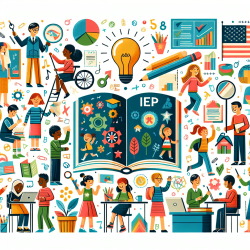Introduction
As practitioners dedicated to supporting children and families, understanding the diverse coping strategies employed by parents of autistic children can significantly enhance our ability to provide effective, culturally sensitive support. Recent research, "A Preliminary Exploration of Different Coping Strategies Used by Korean Immigrant Parents of Autistic Children in High Versus Low Family Quality of Life Ratings," offers valuable insights into this area.
Research Insights
The study focused on 12 Korean immigrant parents of autistic children, divided into high and low family quality of life (FQOL) groups. It identified three primary coping strategies:
- Problem-Focused Coping: High FQOL families actively sought information and resources, leveraging social networks for support.
- Emotion-Focused Coping: Faith and community support played a crucial role in managing stress for high FQOL families.
- Adjustment-Focused Coping: Positive reappraisal and focusing on child strengths were common among high FQOL families.
Implications for Practitioners
Understanding these coping strategies can guide practitioners in tailoring interventions to enhance family well-being. Here are actionable steps based on the research findings:
- Encourage Information-Seeking: Facilitate access to resources and support networks for parents, emphasizing proactive engagement.
- Foster Community Connections: Support parents in building relationships within their communities, including religious and support groups.
- Promote Positive Reappraisal: Help parents reframe challenges positively, focusing on their child's strengths and family resilience.
Encouraging Further Research
While this study provides valuable insights, it also highlights the need for further research into culturally diverse populations. Practitioners are encouraged to contribute to this growing body of knowledge by exploring coping strategies in other immigrant communities and their impact on FQOL.
Conclusion
By applying these research insights, practitioners can better support Korean immigrant families and others, enhancing their quality of life and well-being. To delve deeper into the original research, please follow this link: A preliminary exploration of different coping strategies used by Korean immigrant parents of autistic children in high versus low family quality of life ratings.










